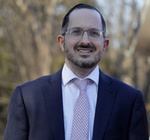
It was during my post graduate studies that I found myself one day in the home of my mentor. We were sitting together, Rebbe (revered teacher) and I, studying at his dining room table. I don’t recall the reason for the personal session or what topic we were studying. But I do recall learning something that day that I hope to always treasure.
We were studying texts diligently together when Rebbe’s 19-year-old daughter – a young lady, still finding her way in life – came in. Essentially, she wanted the keys to the car. But she decided to share a mouthful of what angered her about life in general. It happened so quickly and with such intensity that I didn’t have a chance to pick myself up and leave the room. As I sat in surprised silence, I realized that Rebbe was listening. With soft, empathetic affirmations, he assured her that he heard her. Finally, she was done. Rebbe handed her the car keys, and she was gone in a flash.
It was hard for me to refocus after the interruption. I tried to remain silent; the entire incident was really none of my business. Yet, I found myself blurt out, “Wow.”
Rebbe heard me and said, “Yes, wow. There is a lot going on.”
Feeling a bold sense of permission to say something, I commented, “Rebbe maintained composure throughout….”
He responded, “Yes, that is important to me, that she feels comfortable to talk to me. It is even more important than any response that I can possibly offer.”
“I remind myself,” Rebbe continued calmly, “that even in the intensity, she is sharing real communication. Heartfelt and raw. Maybe not so refined and diplomatic….”
And then Rebbe said something I will never forget. “Do you realize that companies pay millions of dollars in research to know what is going on with their competitors? Countries pay spies millions of dollars to find out what the other side is thinking and planning. In relationships, you can find out what is going on with another person just by listening. Listen well. Especially to someone you love. It costs nothing but willpower. And it reaps awesome dividends.”
Over the years, I have applied Rebbe’s insight to a variety of relationship situations. Communication is powerful. Conversations can uncover real issues if we are prepared to listen well.
Sometimes conversations can get heated. When this happens, I remind myself of a story about Rabbi Avraham Pam. Some children were once socializing in front of the home of a man who had many dogs. Realizing that the man would soon be letting his dogs out into the yard, as he did every afternoon, Rav Pam said to the children, “Do you know why dogs bark?” He answered his own question, “It is their way of talking.
“So, if you hear a dog bark,” Rav Pam continued, “You don’t have to be scared. That is the way a dog talks and says hello.”
Indeed, a few minutes later, the owner let his dogs into the yard. The dogs raced towards the children barking excitedly. But the children had been prepped; they stood at the fence and watched calmly, knowing that the dogs were just talking.
I have found Rav Pam’s message to have broad application in so many areas of communication. Sometimes we engage people who seem to lash out at us. Their tone and method of expression is not as soft spoken and polite as we would like. It might actually feel like they are barking. But if we recognize the bark as a passionate expression, genuine and heartfelt, often coming from a place of real pain, it will be easier for us to overlook the tone and focus on the message.
Opening the lines of communication can lead us to wonderful places. I was once working with a couple who had made much progress in communication. I had great admiration for them; both husband and wife were really working to address the many disconnects in their relationship. One day, in this newfound trusting environment, the woman began to speak.
It was difficult for her to talk about the things that pained her, and it was difficult to listen to. But the husband listened. And when she was done, he said softly, “Thank you for sharing that. I appreciate knowing how you feel.”
Sharing uncomfortable things can be uncomfortable, but it is also a tremendous compliment. When we share something personal and painful means it means we are comfortable enough to share, and that we are hopeful enough in the relationship to trust that we will be heard.
While I don’t encourage “barking” (for a variety of reasons), even a “bark” can be seen as meaningful communication when it comes from a place of hurt and pain. Better than gossip, guessing, or spying, it is possible to find out what a loved one is thinking by listening well.
At times, professionally facilitated conversations are needed. This can be accomplished through a therapist or mediator. When we see communication as a valuable experience, it is possible to listen to almost anything and to deescalate. With time, we can find the appropriate words to express ourselves, address issues, and eventually reach mutual admiration and understanding.
Rabbi Mordechai Rhine is a certified mediator who specializes in marriage mediation. He has served as a community Rabbi for over two decades. He can be reached through his website www.care-mediation.com or by email at RMRhine@gmail.com.
Mordechai Rhine is a certified mediator who specializes in marriage mediation. He is based in Baltimore, Maryland, and services clients throughout the United States via Zoom. Rabbi Rhine has served as a community Rabbi for over two decades. He can be reached through his website, www.care-mediation.com, or by email at RMRhine@gmail.com.
 Previous
Previous

